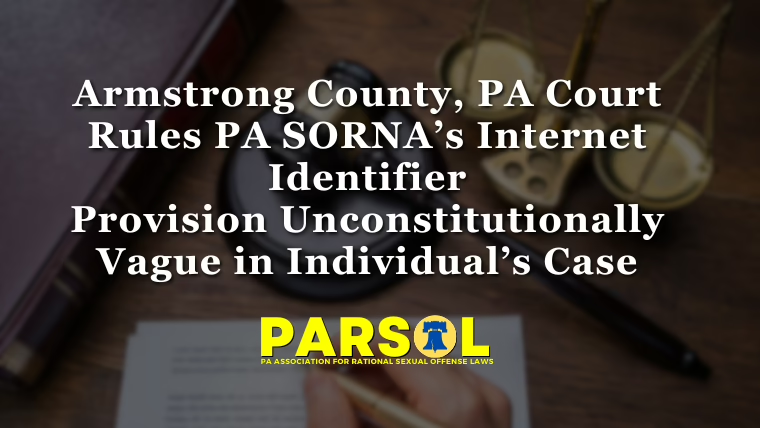Happy New Year from the PARSOL Board of Directors! Thank you for reading our Winter 2022 Newsletter.
2021 has been a busy year advocating for the dignity of Pennsylvanians who are forced to register. Rest assured that 2022 will only be busier. We continually keep a close eye on the legal challenges to PA’s registry that are making their way through the courts. There have been several important developments which we would like to share with you. We’re also excited to announce what we have in store for the coming year.
Recent Court Decisions
PA Supreme Court Deals Another Blow to SORNA I; The Need to Refine Search Warrants in the Electronic Age; Torsilieri PA Constitutional Challenge Gains Steam
December of 2021 brought more hope to Persons/Pennsylvanians Forced to Register (PFRs), but it also showed that more change is needed. We’ll begin with the case of Commonwealth v. David Santana, 23 MAP 2021. In a 5-2 decision, PA Supreme Court (SCOPA) affirmed the Superior Court’s opinion that “Mr. Santana’s registration requirement under SORNA was an after-the-fact punishment, and therefore unconstitutional. Accordingly, he had no duty to comply with those requirements and his conviction for ignoring them, under 18 Pa.C.S.A. § 4915.1(a)(3) [failure to provide accurate information], was a manifest injustice and must be overturned,” Commonwealth v. Santana, 241 A.3d 670, 662 (Pa. Super. 2020) (en banc).
Mr. Santana committed his offense in 1983 in New York. He had to register with New York’s “Sex Offender Registration Act” (“SORA”) when it became effective in January of 1996. Pennsylvania’s “Sex Offender Registration and Notification Act” (“SORNA”) took effect December of 2012. Mr. Santana moved to PA in 2015. He initially registered with the Pennsylvania State Police and continued his duty register in-person but did not register his phone numbers, job, and social media account. For that, he was arrested and charged with failure to provide accurate information.
In short, both Courts have confirmed that the Ex Post Facto Clauses of both the U.S. and PA Constitutions focus on when the underlying crimes occured; where they occurred is irrelevant. I believe this opens the door for anyone who has had a conviction of failure to provide accurate information or failure to register under Megan’s Law I, II, III, and SORNA I overturned if their offense occurred prior to April 21, 1996, effective date of PA’s first Megan’s Law. Why? First, they wouldn’t have the obligation to register making the conviction an illegal sentence. Second, the conviction would be null and void because the statutes were unconstitutional in the first place. “An unconstitutional act is not a law; it confers no rights; it imposes no duties; it affords no protection; it creates no office; it is in legal contemplation as inoperative as though it had never been passed,” Norton v. Shelby County, 118 U.S. 425, 30 L. Ed. 178, 6 S. Ct. 1121 (1886). Any violations or convictions under an unconstitutional act should be overturned.
We live in an age where we store sensitive information about ourselves on technological devices that should be protected under the Fourth Amendment of the U.S. Constitution from unreasonable searches and seizures. This is what Eric Green argued in his case of Commonwealth v. Green, 6 MAP 2021. Sadly, SCOPA didn’t see it his way. “On January 14, 2015, the Pennsylvania State Police applied for a search warrant for Appellant’s [Mr. Green’s] residence. The application included an affidavit of probable cause written by Corporal Christopher Hill (Affiant), who stated that his affidavit was based on information he received from Corporal G. M. Goodyear… Affiant explained that Corporal Goodyear conducted undercover investigations into the sharing of child pornography over the internet… On December 28, 2014, Corporal Goodyear located a computer that was sharing child pornography on BitTorrent, a peer-to-peer file sharing network… Corporal Goodyear was able to download files directly from the user of that computer…” Commonwealth v. Green, 6 MAP 2021 (SCOPA Majority Opinion).
The warrant read as follows:
Any and all computer hardware, including, but not limited to, any equipment which can collect, analyze, create, display, convert, store, conceal, or transmit electronic, magnetic, optical or similar computer impulses or data. Any computer processing units, internal and peripheral storage devices, (such as fixed disks, eternal hard disks, floppy disk drives, and diskettes, tape drives, tapes, and optical storage devices), peripheral input/output devices (such as keyboards, printers, scanners, plotters, video display monitors, and optical readers), and related communication devices such as modems, cables, and connections, recording equipment, as well as any devices, mechanisms, or parts that can be used to restrict access to computer hardware. These items will be seized and then later searched for evidence relating to the possession and/or distribution of child pornography. This search is also to include any and all cellular phones, including, but not limited to, any cellular device that can collect, analyze, create, convert, store, conceal, transmit electronic data, and the items associated with any cellular device such as power cords, bases, sim cards, and memory cards.
Mr. Green argued the warrant was “overbroad in violation of [Article I section 8 of the Pennsylvania Constitution and under the Fourth Amendment to the United States Constitution] […] [the warrant] allowed officers ‘to seize all computers, regardless of who they belonged to or who used them or what they were used for, so that they can search all the files and all of the computers looking for child pornography’.” SCOPA found “no reason to establish a unique overbreadth standard for the contents of electronic devices. Applying the traditional overbreadth standard to the facts before us, we find no error with the lower courts’ determinations that the warrant was not overbroad because it described the physical devices and digital data for which there was probable cause as nearly as may be under the circumstances.”
Justice Wecht dissented stating “[i]n the absence of concrete guidance, the Majority effectively would give law enforcement unfettered access to years’ worth of browsing history, bank records, and conversations—provided only that these are located on an electronic device. On little else than a mere showing of probable cause that an electronic device was connected to some crime, the whole of an individual’s world will be unveiled and broadcast to the government’s prying eyes,” Commonwealth v. Green, 6 MAP 2021 (SCOPA Dissenting Opinion, Wecht).
In Commonwealth v. Torsilieri, both parties filed a Motion for Extension of Time to File Post-Hearing Briefs. Said motion was granted by the Honorable Judge Royer. This comes after the Commonwealth was denied their Petition for Exercise of King’s Bench Jurisdiction by SCOPA. We hope to see this case gain some steam forward to the evidentiary hearing that we’re all waiting for.
As a reminder, Mr. Torsilieri is arguing that SORNA’s Legislative Finding of “sexual offenders pose a high risk of committing additional sexual offenses” violates the irrebuttable presumption principle and PA’s Const. Art. I Sect. I Right to Reputation. This is an opportunity for both sides to provide empirical evidence either proving or disproving the “frightening and high” myth.
The PARSOL Education Committee is putting together a Recidivism Rates Facts Sheet that will show from numerous studies that the recidivism rate of PFRs has been and continuously remains one of the lowest rates of all types of offenses.
As of this printing, no date has been set for the evidentiary hearing.
Remember, Our Legal Team has created a handy resource that collects PA Supreme Court Cases concerning sexual offense challenges. This spreadsheet can be found on our website at https://parsol.org/legal-cases/ .
While PARSOL does not give legal advice, you can send an email to josiah@parsol.org with questions about these and other cases working their way through the Courts.
Legislation Update:
US Attorney General adopts rule change; push to expand SORNA possible in PA.
On December 8th 2021, the US Department of Justice announced a rule change (effective 1/7/2021) that specifies registration requirements under the federal Sex Offender Registration and Notification Act (SORNA). You can find the announcement in the Federal Register here: https://www.federalregister.gov/documents/2021/12/08/2021-26420/registration-requirements-under-the-sex-offender-registration-and-notification-act
What this rule seeks to accomplish is uniformity across the United States with what people on registries must report, and when. In theory, the individual on the Registry is now responsible to comply with federal law by registering correctly in their own state.
What exactly this means for people forced to register in PA is still unclear. Our best guess is that no changes will occur in this state on January 7th. This is because
- There is no federal registry and registration is carried out by states and territories.
- PA’s SORNA is not fully compliant with the federal SORNA’s guidelines, and has not been for years. Because we have not adopted the federal SORNA guidelines 1:1, it is difficult or impossible for the federal government to expect the people on our registry to “do it their way.”
- Our state’s highest court has already determined that SORNA is punishment. Requiring a more invasive punishment on those people who have already been given their sentence is a violation of the ex post facto clause of our Constitution.
As our partners at ACSOL note, however, these rules will likely become mandatory for those people who have been convicted of sexual crimes at the federal level. Unfortunately, no one is able to say in what capacity or when these changes will affect this group of Pennsylvanians.
There exists the possibility that one or more legislators in Harrisburg will propose that we overhaul our state’s laws again and model our SORNA to match federal SORNA. Because of our State Constitution’s Right to Reputation as well as past and pending SCOPA challenges to PA’s sex offense registry, however, this manifestation of a registry in PA will be ruled unconstitutional.
It is the primary goal of the Legislative Committee this quarter to educate on this rule change and to advocate against a push to further expand PA’s ineffective and wasteful sex offense registry.
For more info on legislation, feel free to send an email to randall@parsol.org. We also have legislative resources on our website www.parsol.org/
FAQ Corner
Q:As a PFR, can I be on Facebook and other social media sites?
A: Facebook and Nextdoor have policies that prevent people who are on the Registry from using their services. As private services, they have the right to do this. You can still sign up, but you may be removed and banned. Twitter, Reddit, and NARSOL Connections are all social media sites that all people can freely use.
You can find more answers to your questions on our FAQs page: https://parsol.org/frequently-asked-questions-about-pas-sex-offense-registry/.
Advancing In 2022
The Board of Directors held their annual in-person meeting this past November where we reviewed our strategic plan for 2021 and how to move forward in 2022.
We are looking to expand our membership options by adding a sponsorship for incarcerated persons and a lifetime membership option for corporations and possibly individuals that will include special membership benefits.
Look forward to our increased range of technology use by creating more YouTube content, audio content, and more Twitter and Facebook posts.
We aim to set up virtual office hours once a month where you can speak with us live. We are also planning on revamping our resources section to make it more user friendly and easier to find community resources that fits your needs or the needs of a loved one.
Several of our Board Members sit on the PA Attorney General’s Reentry Coalition (PARC). We meet a few times a year with criminal justice reform advocates from around the state and support positive reforms for all people with criminal histories.
We’ll also be applying for grants in hopes of receiving additional financial support.
If there are any ideas you have in advancing PARSOL, please contact us by submitting a general inquiry at https://parsol.org/contact-us/, call at 717 820 2237, or send us a letter at P.O. Box 399 New Freedom, PA 17349.
Volunteer and Organization Outreach
We continue to be more aggressive in our outreach efforts as we have much planned for 2022. Several people have answered the call with our community support, legal research, letter writing, and outreach to prisoners. But we still have positions to fill. Please reach out to us today if you are interested in lending your talents to any of the following positions:
- Social media coordinator
- Grant writer
- Board member
- Legislative outreach team members
In our efforts to network with attorneys, volunteers have been mailing out letters. We are currently in talks with one attorney on his role with us, but are still actively seeking out a partner.
If you or someone you know would like to support PARSOL or get involved, please see our Volunteer page at https://secure.parsol.org/volunteer/ . You can also give us a call at 717 820 2237 or send us a letter at P.O. Box 399 New Freedom, PA 17349.
Fearless Groups Continue Online
Each month, live online or telephone support is available to those affected by PA’s registry.
Join us on the second Saturday of every month from 4 – 5:30PM as PARSOL hosts a free video / telephone meeting open to all residents of PA who are affected by the public registry. This includes registrants themselves, their family members, and their friends. We aim to create a safe environment free from the influence of law enforcement or treatment providers.
To take part in this one-of-a-kind meeting of people “who get it”, you can either send an email to ashley@parsol.org or call 717 820 2237 .
Tell a friend, or come to the meeting and make one!
In Other News
- PARSOL is a 501c3 organization. This will make donations easier for those who wish to have a tax write-off.
- Please consider securely donating either at https://secure.parsol.org/donate/ or at our physical mailing address, found below.
- Our Share Your Story section has been updated.
- If you have a loved one who has been negatively impacted by PA’s registry, please visit our site and share your story. Your testimony will help us educate people of the collateral consequences of SORNA.
- We’ve included the NARSOL PA State Wiki page under our Resource tab. Look for PA Laws Regarding Registration.
- Check out our News page for updates in Pennsylvania.
If you know someone who is serving a sentence, please send them a copy of this newsletter.
If you are incarcerated and there is content that you would like to see in these newsletters or online, please reach out and let us know. You are not forgotten.
Be sure to follow PARSOL on social media and help us spread the word. You can find us at PARSOL on Facebook, @PARSOL7 on Twitter, and PA Association for Rational Sexual Offense Laws on YouTube
Best wishes,
The PARSOL Board of Directors




![stuckIn1995_rally_header - PARSOL - Pennsylvania Assoc for Rational Sex Offense Laws (PA Megan's Law Resources) PARSOL Board Chair Josiah Krammes speaks at the PA Capitol Rotunda flanked by State Reps. Emily Kinkead and Tim Briggs (28 Oct 2025) [John Dawe/PARSOL]](https://parsol.org/wp-content/uploads/2025/10/stuckIn1995_rally_header.avif)
@ parasol,
I live in Michigan and I just wanted you all to know whenever I need a pick me up, I come to this site.
Thank you for what you do and write.
Dr.